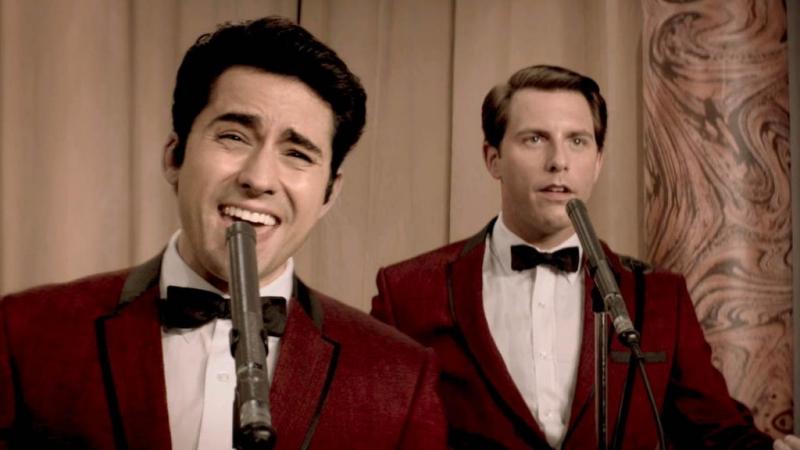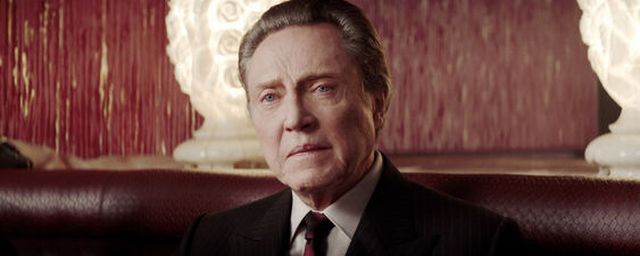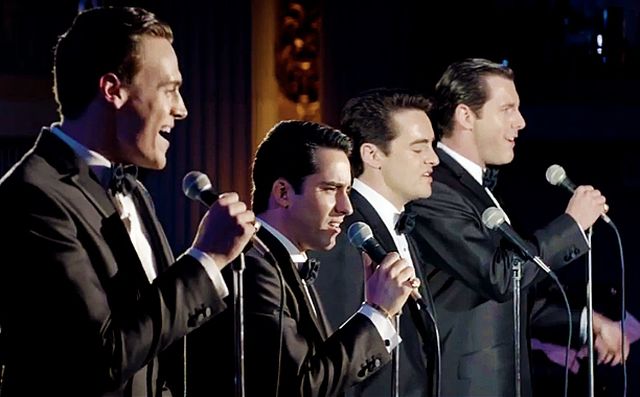Jersey Boys | reviews, news & interviews
Jersey Boys
Jersey Boys
Clint Eastwood biopic plays up the mob but short-changes the music

Given that Jersey Boys is about a singer, Frankie Valli, whose voice - or so we are told within the first five minutes - constitutes "a gift from god", it's a shame Clint Eastwood's film of the stage musical smash hit doesn't feel more heaven-sent. There are thrills to be had across the two hour-plus running time and enough Italian-Americanisms to make audiences feel as if they may have wandered into Goodfellas-lite.
One appreciates Eastwood's desire to take the stage source seriously, keeping the writers (Rick Elice and Marshall Brickman) of the Tony and Olivier-laureled show in place at the expense of Hollywood A-lister John Logan, who had penned a script of his own that then wasn't used. And with the exception of Christopher Walken (pictured below), in ominously soft-spoken form as a local mafia kingpin sporting the (wonderful) name of Gyp DeCarlo, the film goes a commendably unstarry route, picking alumni from the stage show to play three of the Four Seasons; the fourth - and in some ways most commanding - is in the hands of an alluringly cocksure Vincent Piazza, of Boardwalk Empire renown, here giving a lot of lip with or without a cigarette dangling from his mouth.
 Eastwood, too, comes naturally by his musical affinities. Though the 1969 musical Western Paint Your Wagon - "Eastwood sings!" being right up there in celluloid lore with "Garbo talks!" - may top no one's list of his best films, music is threaded in numerous ways throughout his career, from various early Sixties singles to such music-themed movies as Bird and Honkytonk Man. And while one can applaud the director's desire to dig deeper and more darkly into this material for the movies than the stage juggernaut will ever want to, the simple fact is that we want Frankie and the Four Seasons to show us more of the vocal glory without which this film wouldn't exist to begin with.
Eastwood, too, comes naturally by his musical affinities. Though the 1969 musical Western Paint Your Wagon - "Eastwood sings!" being right up there in celluloid lore with "Garbo talks!" - may top no one's list of his best films, music is threaded in numerous ways throughout his career, from various early Sixties singles to such music-themed movies as Bird and Honkytonk Man. And while one can applaud the director's desire to dig deeper and more darkly into this material for the movies than the stage juggernaut will ever want to, the simple fact is that we want Frankie and the Four Seasons to show us more of the vocal glory without which this film wouldn't exist to begin with.
The film begins in Belleville, New Jersey, in 1951, as a 16-year-old hairdresser called Frankie Castelluccio (the Valli, spelled pointedly with an "i" and not an "ey" came later) is honing that famous falsetto, getting in and out of trouble, and generally disregarding his mother's request that he be home by 11 pm. Retaining the direct-to-the-audience narration from the musical that is shared out among the four leads, the movie gives initial pride of place to Piazza's troublemaking Tommy DeVito, the group's spokesman and hothead and easily the most charismatic of the quartet we see on screen. Before long, the straight-arrow Bob Gaudio (Erich Bergen, a stage actor blessed with screen star good looks) has signed on, an introduction effected by no less a personality than eventual Oscar-winner Joe Pesci. The foursome is completed by bass player Nick Massi (Michael Lomenda) who died in 2000, so we'll never know how he might feel about being referred to as their equivalent Ringo Starr.
We get the internecine frictions between the group, alongside various returns to Frankie's domestic rough-and-tumble on the home front - though I'm not sure the lyrics to "My Eyes Adored You" really work as an outpouring of affection from Frankie to his troubled daughter, Francine, who died in 1980. The recording sequences get a pick-me-up from Mike Doyle as the group's celebrated producer and co-songwriter Bob Crewe, here presented as fairly flamboyantly gay: a reminder that behind the surface machismo of the hard-boiled milieu beat all manner of other passions.
 And the songs - ranging from the doo-wop dazzle of "Sherry" through to the finger-clickin' strut of "Walk Like a Man", "Let's Hang On", and (my personal favourite) "Rag Doll"? They are there like teases from some glorious onstage life even as we trawl the corridors backstage, their collective power reserved for a lovely final credit sequence in which the show's choreographer, Sergio Trujillo, puts the cast through their paces. One only wishes that Young's voice didn't sound as frayed at times as it does here, a consequence perhaps of his unyielding commitment to portraying Frankie on stage. (The 38-year-old performer did a brief run on the West End in the role earlier this year.) The real Frankie's preternaturally high register - a function of helium or what? - can be punishing on the voice, and at least Young connects up to the part in other important ways; he knows the role from the inside out, not just as a series of vocal tricks and affectations.
And the songs - ranging from the doo-wop dazzle of "Sherry" through to the finger-clickin' strut of "Walk Like a Man", "Let's Hang On", and (my personal favourite) "Rag Doll"? They are there like teases from some glorious onstage life even as we trawl the corridors backstage, their collective power reserved for a lovely final credit sequence in which the show's choreographer, Sergio Trujillo, puts the cast through their paces. One only wishes that Young's voice didn't sound as frayed at times as it does here, a consequence perhaps of his unyielding commitment to portraying Frankie on stage. (The 38-year-old performer did a brief run on the West End in the role earlier this year.) The real Frankie's preternaturally high register - a function of helium or what? - can be punishing on the voice, and at least Young connects up to the part in other important ways; he knows the role from the inside out, not just as a series of vocal tricks and affectations.
Visually, the film inhabits the desaturated realm that has become the Eastwood norm and that after a while begins to seem a metaphor for the movie as a whole. As impressive as it is, and Manhattanites in particular will relish the sequence where the camera pans up the facade of the legendary Brill Building at 1619 Broadway, one is left posing a single overarching question: could we have just a bit more colour?
Overleaf: watch the trailer for Jersey Boys
rating
Share this article
The future of Arts Journalism
You can stop theartsdesk.com closing!
We urgently need financing to survive. Our fundraising drive has thus far raised £49,000 but we need to reach £100,000 or we will be forced to close. Please contribute here: https://gofund.me/c3f6033d
And if you can forward this information to anyone who might assist, we’d be grateful.

Subscribe to theartsdesk.com
Thank you for continuing to read our work on theartsdesk.com. For unlimited access to every article in its entirety, including our archive of more than 15,000 pieces, we're asking for £5 per month or £40 per year. We feel it's a very good deal, and hope you do too.
To take a subscription now simply click here.
And if you're looking for that extra gift for a friend or family member, why not treat them to a theartsdesk.com gift subscription?
more Film
 Urchin review - superb homeless drama
Frank Dillane gives a star-making turn in Harris Dickinson’s impressive directorial debut
Urchin review - superb homeless drama
Frank Dillane gives a star-making turn in Harris Dickinson’s impressive directorial debut
 Mr Blake at Your Service review - John Malkovich in unlikely role as an English butler
Weird comedy directed by novelist Gilles Legardinier
Mr Blake at Your Service review - John Malkovich in unlikely role as an English butler
Weird comedy directed by novelist Gilles Legardinier
 Don't Let's Go to the Dogs Tonight review - vivid adaptation of a memoir about a Rhodesian childhood
Embeth Davidtz delivers an impressive directing debut and an exceptional child star
Don't Let's Go to the Dogs Tonight review - vivid adaptation of a memoir about a Rhodesian childhood
Embeth Davidtz delivers an impressive directing debut and an exceptional child star
 One Battle After Another review - Paul Thomas Anderson satirises America's culture wars
Leonardo DiCaprio, Teyana Taylor, and Sean Penn star in a rollercoasting political thriller
One Battle After Another review - Paul Thomas Anderson satirises America's culture wars
Leonardo DiCaprio, Teyana Taylor, and Sean Penn star in a rollercoasting political thriller
 Steve review - educator in crisis
Cillian Murphy excels as a troubled headmaster working with delinquent boys
Steve review - educator in crisis
Cillian Murphy excels as a troubled headmaster working with delinquent boys
 Can I get a Witness? review - time to die before you get old
Ann Marie Fleming directs Sandra Oh in dystopian fantasy that fails to ignite
Can I get a Witness? review - time to die before you get old
Ann Marie Fleming directs Sandra Oh in dystopian fantasy that fails to ignite
 Happyend review - the kids are never alright
In this futuristic blackboard jungle everything is a bit too manicured
Happyend review - the kids are never alright
In this futuristic blackboard jungle everything is a bit too manicured
 Robert Redford (1936-2025)
The star was more admired within the screen trade than by the critics
Robert Redford (1936-2025)
The star was more admired within the screen trade than by the critics
 Blu-ray: The Sons of Great Bear
DEFA's first 'Red Western': a revisionist take on colonial expansion
Blu-ray: The Sons of Great Bear
DEFA's first 'Red Western': a revisionist take on colonial expansion
 Spinal Tap II: The End Continues review - comedy rock band fails to revive past glories
Belated satirical sequel runs out of gas
Spinal Tap II: The End Continues review - comedy rock band fails to revive past glories
Belated satirical sequel runs out of gas

Add comment